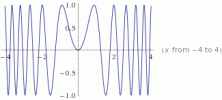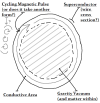Q: Electrical energy will be present in everything. But in some particular substances, such as those things we call conductors, the electrical energy is, as you said, collected, trapped and channeled, which then is a useful activity because it creates light and runs machines and so forth...
A: Primitive.
Q: Okay. It is primitive. We understand that. When electricity moves in what would be considered a superconductor, how is it different from an ordinary conductor, such as a copper wire?
A: Accelerates flow, thus separating electrons, thus "exciting" process.
Q: What qualities does the superconductor have that contributes to this accelerating of flow?
A: Cycling magnetic pulse.
Q: What creates a cycling magnetic pulse?
A: Matter within gravity vacuum.
Q: How do you create a gravity vacuum?
A: In this case, it is created unintentionally as a byproduct of superconductivity.
Q: You said that a superconductor separates the electrons, thus exciting the flow. What do you mean by separating?
A: From each other.
Q: How is that different from a normal electric flow?
A: Not as widely separated.
Q: Is this separation of electrons a key to this process?
A: Yes.
Q: What additional conditions or qualities contribute to the separating of electrons?
A: Ask yourself now, what conditions define a superconductor?
Q: (L) What defines a superconductor? (A) Zero resistance. (V) Is that without gravity? (A) No heat. (L) How does one achieve zero resistance?
A: Artificial construct.
Q: Do you mean that it is an artificial idea, or that the only thing that would have zero resistance would be something that is artificially constructed.
A: Both.
Q: So, there is no actual possibility for a true superconductor with absolutely zero resistance? But that the resistance can be reduced to a very low level.
A: Close.
Q: Does cold necessarily have something to do with superconductivity?
A: What conditions exist in outer space?
Q: Well it is VERY cold... (A) It is almost a vacuum. (L) No gravity. (A) No, there is gravity, but only that. What I think we must ask is what is the relation between superconductivity and gravity. There was something mentioned... what was that about aether?
A: Nonmaterial realm of existence.
Q: (L) In other words, consciousness. Okay, you mentioned a cycling magnetic pulse that was an unintentional byproduct of superconductivity, and something about matter within a gravity vacuum... Could you define a cycling magnetic pulse?
A: Self explanatory.
Q: You said it was derived from matter within a gravity vacuum. Does that mean that superconductivity creates a gravity vacuum?
A: Yes.
Q: (A) Where? Within the superconductor or outside?
A: Within.
Q: (A) According to what we know, it also creates an electromagnetic vacuum. Is it correct that there is no magnetic field within the superconductor?
A: We have stated before that these two properties are interwoven.
Q: (L) Electromagnetism and gravity. So, if there is no gravity, there is no electromagnetism. But then where is the magnetic pulse?
A: Pulse exists outside of gravity vacuum, but within superconductor. Picture a tube structure.
Q: Is the superconducting state within the gravity vacuum or within the EM pulse?
A: All inclusive. Normal structure for channeling electron flow within a conductor is a solid "tube," within superconductor, it is a "hollow" tube structure, thus evidence of vacuum.
Q: Does this hollow tube structure have any bearing on what you described as the separating of electrons?
A: It is a manifestation of same.
Q: So, in order to have a superconductor, one ought to have a temperature similar to the temperature in space, as well as possibly a chemical construction that is similar to the ambient properties of space, only greatly condensed, would that be it?
A: Close.
Q: (A) Do they mean there is zero gravity without superconductor? They say a vacuum which means what? No gravity?
A: Within.
Q: (A) No gravity within.
A: Not "no," just far less, and fragmented in nature.


 I'm having some trouble trying to understand this stuff, as I will try to explain.
I'm having some trouble trying to understand this stuff, as I will try to explain.



